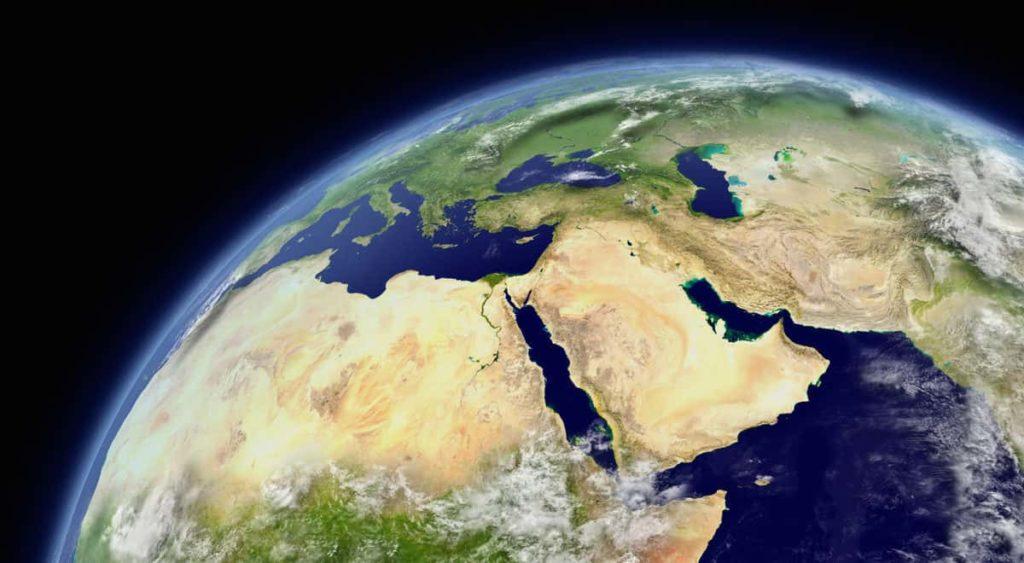Cultural foundations in the Middle East

Middle East viewed from space with atmosphere and clouds. Elements of this image furnished by NASA.
Originally published by Jewish Policy Center
While Americans and Israelis are most unnerved by the weakness and ineffectiveness of the technical terms of the Joint Comprehensive Plan of Action (JCPOA) or the 2015 Iran nuclear deal, our Arab allies in the region—particularly Saudi Arabia—are far more anxious about the geostrategic impact of the perceived willful abdication by the United States of its regional position that is implied by Washington’s desperation to reach a deal at almost any cost.
The Cultural Foundations of Regional Politics
To understand how unnerving America’s behavior is to our regional Arab allies, we have to understand how different the foundation of their politics is from ours. Americans believe in the universal nature of our concept of freedom. Thus, we tend to give short shrift to the influence of culture and civilization on the political mentality of states. In the Middle East, alongside the physical remains of ancient civilizations, the remains of their cultures underlie the region’s politics.
The political imagery of many Islamic cultures emanates from their nomadic, tribal and clan origins, which were hardly attenuated by 500 years of rule by the Ottoman Turks, since they too originate from a nomadic culture.
In some cases, Islam overlays an older urban culture that still shapes politics. Iran, for example, has to be understood in these terms, with the image of the poplar tree bending in the wind. The tree is the ancient core of Persian civilization and the wind is the overlay of Islam.
The core of Arabia—the Saudi Peninsula, the Hejaz (coastal Arabian Peninsula), the desert area of Iraq, Syria and Jordan and the southern littoral of the Persian Gulf—is deeply tribal in its essence. And its culture has a long history, established well before Islam.
In ancient times, the most important Arab tribes filled the power spaces between great urban civilizations rather than function as empires themselves. The period between 100 BCE and 700 CE was marked by regional competition among the global superpowers of the day—the Roman empire and its successor the Byzantine empire, Persia and Abyssinia. The Arabs were divided in their allegiance and aligned their interests accordingly. The Ghassanid Arabs, who were mostly in the western end of the Arabian regions, aligned with Rome and to some extent Abyssinia. Those in the east and the Persian Gulf littoral, the Lakhmids (the al-Manadhirha or Banu Lakhm), tended to assist the Persian empire. In the lower Hejaz there was a very substantial Jewish population, especially in the area of Medina. The Lakhmid attempt to align with Persia a century before Muhammad, in order to establish an independent realm by rebelling against Rome and Abyssinia, is essential to understanding not only the theological ferment, but also the geopolitical influences that shaped early Islamic politics.
The rise of the Arab Umayyad and the Abbasid empires did little to change the tribal essence of Arab culture. True, there were independent Arab empires anchored to the urban centers of Damascus and Baghdad, and they did absorb some traits from the very urban Byzantines and Persians. But these were rather short-lived, ahistorical anomalies. Baghdad, for example, fell in 965 CE to the Persian Buyids.
The tribal soul, rather than the ethos of urban empire, and the strategic behavior that soul engenders, are easily visible in current Arab politics. One need look no further than the most important myth cycle of the Byzantine world—Digenis Akritas (the Dual-Blooded Border Guard). It describes the border world of the Byzantine empire between the 5th to 12th centuries in the deserts of today’s Syria, Iraq and Jordan. One cannot but be impressed by the deeply rooted tribal and clan nature even of these “Byzantinized” Arab border guards.
Read more HERE.
- Tensions build on Iran - February 28, 2026
- Let Israel start, and let the Iranians win - February 26, 2026
- Dr. David Wurmser reacts to the Israeli Government’s attempt to safeguard archaeological sites - February 17, 2026
